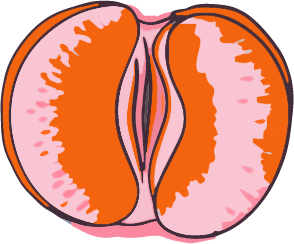Hate to break it to ya, but yup, the “G spot” doesn’t exist..
Ahhh the G spot, we’ve all got one you know, hidden away in some mystical part of our vagina. Ignore your “amputated penis”, find the G spot and you release the mysterious female orgasm, cos when your G spot is touched, your limbs turn into clouds and your core turns into honey. So why haven’t I found mine? Why haven’t any of my friends found theirs? Could it be that this “spot” has no scientific basis and is actually a lie perpetuated by the patriarchy to keep our focus on penetration and sex centred around male pleasure? Surely not?
Hate to break it to ya, but yup, the “G spot” doesn’t exist. Say what you want, there’s no scientific evidence of the G spot existing.
Now, that’s not to say if you do get pleasure from some distinct area within your vagina you shouldn’t maximise the fuck out of that (I would). But the reality is, the G spot has been this searched for “thing” by both men and women for the last 40 years, mainly to no avail, after all 44% of women have felt some form of frustration, confusion, or anxiety while trying to locate their G-spot. So isn’t it time to look at it from a fresh, female lens?
Since the term was coined (and named after a man, obvs) in the early 80’s, sex changed. The G spot heralded in a new era of sex, giving both women and men an elusive new target to aim for. Talk around sex changed, TV shows and movies became obsessed with glorifying the G spot, magazines shared countless hypocritical methods to help women find theirs. Even now, Google “Where is the G Spot?” and you’ll be met with a million how-to guides and roadmaps to experiencing the “ultimate pleasure”. This hunt has become big business, there are now specific G-spot vibrators, G-spot condoms, G-spot lube and even G-Spot surgery (which is just another level of fucked up).
All of these products, all of this obsession and yet, the woman who actually helped “discover” it, says we’ve all been obsessed with the wrong thing. Beverly Whipple says that her research didn’t mean every single woman has a G spot. They were talking about an “area” that basically made some women feel good. Not quite the amazing, one orgasm to rule them all the media make it out to be then.
Without wanting to get all sciencey on you, since it was “discovered”, researchers have described the G spot as a ridiculous amount of things, from the initial spot to rope-like, a gland, the urethral sponge, a grape-like sac, yeah, boring I know. The thing is though, despite all of this, no one has actually found any proof that the G spot exists. Let’s stop trying to make out that all women are the same, experiencing pleasure the same way, you can’t standardise a vagina.
For some women, there is sexual sensitivity where the G spot is supposed to be, for others, there’s not. Or it’s to the left, right, top, bottom, square, triangle or all of the above. That’s what we should be focusing on, it’s all okay. It can all feel good. So, instead of placing the vaginal orgasm on a pedestal, how about we focus on what works for each woman individually.
Back in the early 80’s, when synthpop was ruling the charts (or so my mum tells me), we were oh-so close to female pleasure moving in the right direction. More and more research was being released showing the clitoris as the primary way for women to orgasm, that was until the infamous G spot research put pressure on women to orgasm from penetration despite the evidence showing most women’s bodies just aren’t wired that way. Can we pretend that research never existed pls?
After all, if you think about why so much emphasis is on vaginal stimulation, it’s because it puts the focus on male pleasure. I mean, imagine having a penis and the best way for someone to have pleasure was for you to put your penis in their vagina. Dreamy, amirite? Stupidly, that’s what men think, 60% of ‘em think that the G spot is the “best way” for a female partner to achieve pleasure. Sigh.
So if you ever hear a guy saying “My last girlfriend wasn’t this much work” or “You take a long time to orgasm” or “This worked for the last person I slept with”, don’t question whether you’re normal, just remember how skewed their perspective on female pleasure is. If it’s not working for you, stop looking, stop worrying about vaginal orgasms and just follow the golden rule. If it feels good, you’re doing it right.
